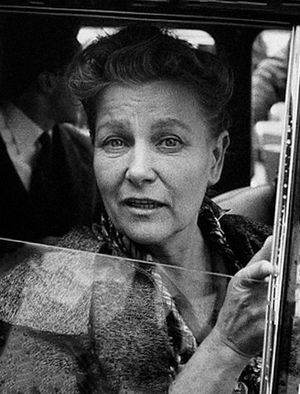Yekaterina Furtseva facts for kids
Quick facts for kids
Yekaterina Furtseva
Екатерина Фурцева |
|
|---|---|

Yekaterina Furtseva in 1964
|
|
| Minister of Culture | |
| In office 4 May 1960 – 24 October 1974 |
|
| Premier | Nikita Khrushchev Alexei Kosygin |
| Preceded by | Nikolai Mikhailov |
| Succeeded by | Pyotr Demichev |
| First Secretary of the Moscow City Party Committee | |
| In office 17 November 1954 – 30 June 1957 |
|
| Preceded by | Ivan Kapitonov |
| Succeeded by | Vladimir Ustinov |
| Full member of the 20th Presidium | |
| In office 29 June 1957 – 31 October 1961 |
|
| Candidate member of the 20th Presidium | |
| In office 27 February 1956 – 29 June 1957 |
|
| Member of the 20th Secretariat | |
| In office 27 February 1956 – 4 May 1960 |
|
| Personal details | |
| Born | 24 November 1910 Vyshny Volochyok, Tver Governorate, Russian Empire |
| Died | 24 October 1974 (aged 63) Moscow, Russian SFSR, Soviet Union |
| Nationality | Soviet |
| Political party | Communist Party of the Soviet Union |
| Profession | Civil servant |
Yekaterina Alexeyevna Furtseva (Russian: Екатерина Алексеевна Фурцева; December 7, 1910 – October 24, 1974) was an important Soviet politician. She was the second woman to become a secretary of the Central Committee of the Communist Party of the Soviet Union. The first woman to hold this role was Yelena Stasova.
Contents
Early Life and Political Start
Yekaterina Furtseva was born in Vyshny Volochyok. For many years, she worked as a weaver in textile factories in Moscow. She also worked for the Communist Party in areas like Kursk and the Crimea.
In 1941, she graduated from the Institute of Chemical Technology. This marked a turning point in her career.
Rising Through the Ranks
Furtseva's political career began during the time of Joseph Stalin. She became very active in the Komsomol, which was a youth organization. By 1950, she was the Secretary of the Moscow City Council.
In 1952, she gave a speech at the 19th Congress of the CPSU. This was the last party meeting during Stalin's leadership. At this congress, she was chosen as a candidate member of the Central Committee of the CPSU.
Under Nikita Khrushchev, who supported her, Furtseva became the first secretary of the Moscow Committee of the CPSU. She held this important job from 1954 to 1957. Khrushchev himself had held this position in the 1930s.
A Challenge to a Film Star
In 1952, Furtseva criticized a famous film star named Boris Babochkin. He was well-known for playing the character Vasily Chapayev. Furtseva was upset by how Babochkin showed Soviet leaders in a play.
She wrote an angry article in the newspaper Pravda, calling for the play to be censored. This action helped her career in the Soviet government. Furtseva then ordered that film studios and drama groups should not hire Babochkin.
Joining the Politburo
In 1956, Furtseva was made a Secretary of the Central Committee. She was also chosen as a candidate member of the Presidium of the Central Committee, also known as the Politburo.
The next year, she became the first woman to be a full member of the Politburo. In this role, she supported Khrushchev's efforts to move away from Stalin's policies, known as de-Stalinization. She helped Khrushchev when some leaders, like Vyacheslav Molotov, Georgy Malenkov, and Lazar Kaganovich, tried to remove him from power.
Minister of Culture
In May 1960, Furtseva's role as a Secretary of the Central Committee changed. She was then appointed the USSR Minister for Culture. It is believed this change happened because she had criticized Khrushchev in a phone call.
At the next party meeting in October 1961, she was also removed from the Presidium. However, she continued to serve as the Minister for Culture for 14 years. In this role, she became very influential. Many actors and directors tried to befriend her to help their own careers.
In June 1974, the newspaper Pravda reported that she had not been re-elected to the Supreme Soviet. She died in Moscow a few months later, with the official cause being heart failure. Yekaterina Furtseva is buried at the Novodevichye Cemetery.
See also
 In Spanish: Ekaterina Furtseva para niños
In Spanish: Ekaterina Furtseva para niños
 | Valerie Thomas |
 | Frederick McKinley Jones |
 | George Edward Alcorn Jr. |
 | Thomas Mensah |

